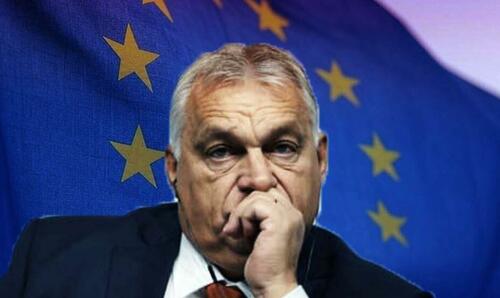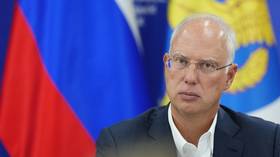
Which Left-Wing NGOs Does Brussels Fund In Hungary (With Taxpayer Money) To Go After Orbán?
Authored by Liz Heflin via Remix News,
The European Commission is essentially manipulating NGOs to achieve its own goals in exchange for financial support. A Dutch newspaper has exposed part of this process, writes Magyar Nemzet, which then shows how Brussels does this and who the biggest domestic beneficiaries are.

On Jan. 22, De Telegraaf reported on secret contracts that the European Commission had signed with green NGOs to conduct alleged covert lobbying activities. According to the newspaper, the lobbying organizations, commissioned by Brussels with EU money, were tasked with persuading MEPs and member states to support the commission’s ambitious green policy initiatives.
For example, the European Environment Bureau (EEB), an umbrella organization for green groups, was tasked with providing at least 16 examples of how the European Parliament had tightened green legislation thanks to its lobbying. According to documents reviewed by the newspaper, the EEB was also tasked with supporting the controversial nature restoration bill initiated by former Commissioner Frans Timmermans.
In addition, they could use around €700,000 in support to steer the debate on agricultural activity in a more environmentally friendly direction.
In Hungary, the EU provides funding to certain organizations, which then use their activities to serve Brussels’ political goals. Here are some examples.
The Hungarian Helsinki Committee is heavily dependent on international funding. According to their latest available financial report for 2023, more than 61 percent of their annual income came from private foundations, including George Soros’s organization. They received a total of 48.85 million forints from the European Commission, which accounted for 6.1 percent of their income. Helsinki has received funding for various projects serving legal protection purposes, typically for several years.
In recent years, the organization has often criticized the Hungarian government’s immigration policy, especially the measures related to border closures and the operation of transit zones, and has also undertaken the legal representation of migrants, for example, at the European Court of Human Rights.
One of the “results” of Helsinki’s operation is that in June 2024, the European Court of Justice imposed a migration fine of €200 million on Hungary and ordered our country to pay an additional €1 million per day until we change the relevant regulations.
Helsinki has actively contributed to the European Commission’s 2023 Rule of Law Report, which contains a number of criticisms of Hungary, including problems and recommendations in the areas of justice, the fight against corruption, and institutional checks and balances. The Helsinki Committee, together with other NGOs, including Transparency International Hungary, has submitted a nearly 100-page submission to the European Commission, which is withholding billions of euros from Hungary.
Transparency International Hungary (TI Hungary) has regularly attacked the Hungarian government in recent years, primarily on issues related to corruption, lack of transparency, and the management of public funds.
The organization also receives significant foreign funding, including funds from Soros’ Open Society Foundations, but their supporters also include the European Commission, from which they received a total of 13.7 million forints in revenue, according to their 2023 report.
Transparency International produces its Corruption Perceptions Index (CPI) every year, which is used to calculate which countries are the most and least corrupt in the world. Tamás Lánczi, president of the Office for the Protection of Sovereignty, has already held the organization accountable for the bias experienced in determining the CPI.
All of this is significant because the index serves as a reference point for the withholding of EU funds due to Hungary.
The 2023 report from Amnesty International Hungary shows that the organization is significantly dependent on foreign sources.
Their revenues from the European Union budget, as well as other states and international organizations, exceeded 170 million forints, which represented 42 percent of their total revenue in that year.
They received almost 53 million forints in funding from the European Commission in 2023, which is almost 13 percent of their total annual income. They received the money as the winner of a call for proposals under the Citizens, Equality, Rights and Value (CERV) program to promote gender equality. Amnesty has been working against Hungary’s interests on several fronts, as shown below.
The organization reports that it prepared its analysis related to the European Commission’s annual rule of law assessment, which examined, among other things, the Hungarian justice system, corruption, the press, civil society organizations, and the legislature. It says: “The success of our work, which has been carried out for four years, together with our civil society friends, is also demonstrated by the fact that many of our recommendations are reflected in the report published in July.”
In other words, they are explicitly proud of having put Hungary at a disadvantage.
The annual report also mentions that in March 2023, in addition to the European Parliament, 15 EU member states joined the European Commission v. Hungary lawsuit filed on the side of the commission over the child protection law adopted in 2021. Amnesty boasts that the actions of many member states are due to their work.
The Hungarian Digital Media Observatory (Lakmusz–HDMO) was established in January 2023 as the Hungarian center of the European Digital Media Observatory (EDMO), established by the European Commission in 2020. Six organizations work together within the framework of the project: Political Capital, Mérték Médiaelemző Műhely, AFP news agency, Lakmusz, Idea Foundation and Epresspack. According to their own admission, their activities include fact-checking and related research and analysis, and they also provide training for journalists and teachers on the topic of fact-checking and conscious media consumption.
The HDMO Project is being implemented with the partial support of the European Commission, and the consortium forming the HDMO was selected by the Commission through an open tender. Lakmusz, which participated in the project, has also previously attacked the Hungarian government. For example, they have tried to discredit the institution of the national consultation on several occasions. Political Capital, Mérték, and Lakmusz can also be directly or indirectly linked to the foundations of George Soros.
Read more here…
Tyler Durden
Wed, 02/12/2025 – 05:00









